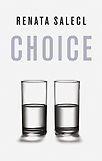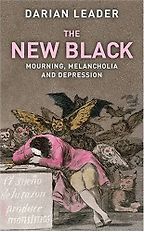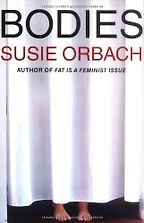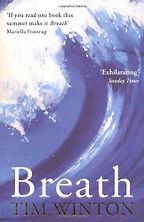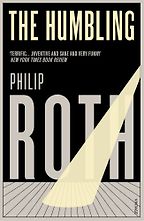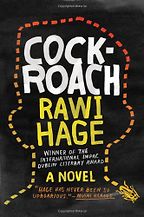Why misery?
I wanted to go against the presumption that happiness is the theme of today’s life. This ideology of happiness has actually produced more unhappiness than needed, since we’ve constantly been measuring our lives with regard to success, or self-fulfilment, or enjoyment. From a psychoanalytic point of view it’s been known for a long time that total satisfaction is completely impossible to attain.
“From a psychoanalytic point of view it’s been known for a long time that total satisfaction is completely impossible to attain.”
The books I chose describe the most prevalent forms of unhappiness linked to the expectations that we have in today’s post-industrial capitalism. Those expectations are: long life, beautiful body, a sexually satisfied life, creatively satisfied life, an ideal of self-making. The idea is that we have the power to create this ideal life – and exactly these books reverse this presumption.
Tell me about The New Black.
Darian Leader is a British psychoanalyst who in a great way undermines today’s ideas about depression. He starts with the premise that we live in a society of hyped optimism, where depression appears as a danger that goes against optimism – it’s something for people who gave up the fight for success or whatever. Today we use the terms depression and stress too much – they dominate psychiatric and self-help discourse.
They’re debased terms; you might be ‘depressed’ if you miss the bus.
Absolutely. Or just the common boredom of children can be described as depression. But what Darian does is to return to the difference between melancholy and mourning, and he makes a great distinction between them. It’s very good to return to these different roots of depression, and to stay with them – not as traumatic things, but as something pretty normal which has been forgotten.
So we should re-codify depression?
Not perceive it as a unified term, but to see it as various different things, which is why he is using the old terms of melancholy, mourning, and loss.
Darian is also critical of the pharmaceutical industry: depression appears as something universal that can be quickly dealt with using pretty much universal types of drugs. But, as he points out, this denies the fact that the symptom is connected to some cause beyond the depression. He shows that in depression everyone has a different logic and a different individual story, which can be linked to loss – of another human being, of identity, of a job, of health or love. It can also be linked to being stuck in circulating around some lack.
“In depression everyone has a different logic and a different individual story.”
He particularly shows that what we cannot deal with easily today is mourning. Not only mourning people we have lost, where it is quite easy to see why someone is sad; but whenever we lose someone we mourn not only that person, but also who we were for that person – and that’s much more difficult to overcome. Our society has a hard time dealing with that: previous societies (he uses a lot of anthropology) had long rituals related to mourning for the beloved and so on.
Contemporary society has a problem with death altogether.
Absolutely. There’s a denial of death, almost a prohibition of thinking about it, and an attempt to prolong life unrealistically. We try to stay away from a person who is mourning. And he shows that mourning and loss can be very much helped with various social rituals, as it was in the past. For example, children today are almost not allowed to attend funerals. But funerals have a huge symbolic role, especially for small children if their grandparent dies, to be part of saying goodbye and be part of the ritual.
He also deals with the important difference between lack and loss. He points out the problem that we have with loss as such: sometimes we lose something and can pinpoint what we have lost. But sometimes actually we are stuck in a particular deadly enjoyment of circulating around a lack in our life, and that can be a completely different melancholic state from a mourning state.
In the conclusion he sees a way of overcoming this stuckness via artistic production. Some artists, for example, have been very good at circulating around the pain of lack, and have created great works of art. So not only has melancholy been the cornerstone of a lot of cultural production in the past and today, but it can even be its engine.
If you were to read this looking for some prescription for your own life, wouldn’t that set up unrealistic expectations? Not everybody has a creative spark.
That’s a great point. Unfortunately life is perceived as a work of art; everyone is supposed to work on life as a special project or a business plan. I would think that he’s not planning to push everyone into creation; what he is doing is basically unpacking and destigmatising depression and showing that it’s a really dangerous term to use universally. That’s where I think he helps everyone.
Next book.
Susie Orbach is a so-called relational psychoanalyst, and she wrote this book, Bodies, where she looks at how the body is perceived in post-industrial, late capitalism. Again we have the idea of body as a product, something that you work on and that is completely in your power. Of course, the cosmetics and dieting industries have hugely contributed to this, so she makes a social critique, pointing out that in some way capitalism relies on our unhappiness with the body.
Perhaps people enjoy the unhappiness of not being able to conform to expectations?
Yes, I think that they do, which is why she speaks about women who really find a painful enjoyment in being fat. She finds for a lot of women being fat is a protection – a shield either from love, or from being perceived as a sexual woman.
It’s very readable – each story starts with the story of a client of her clinical practice: women of various ages and their unhappinesses. She looks at why women perceive the body as a product, what role the obsession with thinness plays, and how it culturally changes. For instance, she looks at Fiji, which some years ago perceived a little bit more rounded body as an ideal; now they have a huge increase of anorexia which she links to the influence of the media on this society.
“In some way. capitalism relies on our unhappiness with the body.”
She looks at what image is proposed by the dominant media, what impressions it gives to young women. She also looks at very particular mother-daughter relationships which are emerging: how an obsession with body image is being passed from generation to generation. Sometimes it happens that mothers instil this enormous feeling of guilt to their daughters over their bodies, because of their own anxieties with their own bodies.
What I like about her work is that she’s also looking at the new symptoms she observes in practice. She said recently that she’s observing more and more women, mid-thirties, coming to her office who actually had made ideal choices in their lives, and ticked all the right boxes on the life plan: they found the best job, best school, great clothes, even have a great body and a great partner, and they come to analysis with the fact that they are empty – so they don’t even have a complaint. This is exactly where a new problem is emerging for psychoanalysts: you have an emptiness – or, going back to Leader’s book, you would say a new form of depression. There should have been satisfaction: ‘I thought if I do everything right, there’ll be this feeling of fulfilment at the end, so why am I miserable?’
Is it just about women’s bodies?
No, it looks at male bodies too: it has a whole section about men trying to create an ideal body so it’s definitely not only for women, but of course it has more examples of female clients than male clients.
Next book?
Tim Winton’s Breath. It’s a novel about a main character Bruce ‘Pikelet’, who as a teenager becomes obsessed with surfing, and who, with his friend ‘Loonie’, starts observing an old surfer, Sando, who used to be an ideal in their little town, and who knows how to catch the best wave. The whole story is really about the enjoyment one finds in transgressing the boundary between life and death, and coming close to death but not dying. It starts with the boys trying to be underwater as long as possible and afterwards it becomes an obsession of going to the edge in many ways. Loonie becomes more of a favourite of Sando, but Bruce finds other enjoyments by starting a sexual relationship with Eva, Sando’s partner. When Sando picks Loonie as his surfing partner, Bruce is left hanging around the house with Eva, and a seduction happens, so, at the age of 14, he is introduced into sexual pleasures which are also an unbelievable edge for him.
Five Books interviews are expensive to produce. If you're enjoying this interview, please support us by donating a small amount.
What’s interesting are the descriptions of the surfing. It’s the most wonderful description of coming to the edge, searching for ever new extremes, coming to the point of death, and then at the last second avoiding it. A lot of the scenes are when you almost think the two characters have drowned and somehow then they resurface.
“The whole story is really about the enjoyment one finds in transgressing the boundary between life and death, and coming close to death but not dying.”
I chose it because it picks apart our search for enjoyment in today’s society, and shows how that is often linked to near-death experiences. It’s really interesting how overwhelmingly present the search for extreme sports is now. In Slovenia, as a small country, we have an obsession with people climbing the Himalayas, so every year there’s usually one or more people who die there.
The idea with a lot of these extreme sportists is they’re searching the edge – what death looks like. There is an enjoyment, where again Freud was right: where Eros and Thanatos go hand in hand. Although we try to avoid death in today’s culture, with extreme sports we are actually endlessly testing it, trying to master it, to a point.
The book sounds fairly optimistic.
It is in the end, but it’s definitely about death drive and the search for the ultimate transgression of life, and the sexuality intertwined with it. The main character says that when a surfer finds the most extraordinary wave, that’s the only time he has lived; and you endlessly search for them to the point of killing yourself. You expect that you might lose your life but it’s worth it: that’s the ideology behind it.
Philip Roth’s The Humbling.
It’s not the best of Roth’s novels but it’s nonetheless important. The main character, Simon, is an actor who has lost his spark and can’t perform any more. He loses his fame, and his wife, and ends up in a psychiatric hospital. He becomes an ageing loner, and so the first part appears just a sad debate over a lost life – where the person’s still alive. Then he finds a young lover who used to be a lesbian and they start a passionate affair which ends badly. Problems arise because the lover is the daughter of his friends from youth, and then another young woman emerges whom they first use in a threesome and, basically, you then have an endless series of losses again.
So it’s about ageing and I think why it’s important is because we see the capacity to hold on longer. It is possible with the help of medicine to very much prolong life, but the tragedy is that desire remains: for satisfaction – especially sexual and creative satisfaction. What Philip Roth has been describing now for some time is how painful it is when you are old and you don’t have those moments in life which you perceived as the ultimate satisfaction: especially moments of big love, or sexual relationship.
“It is possible with the help of medicine to very much prolong life, but the tragedy is that desire remains.”
The American ideology for some has been that it’s never too late for a new start, which goes against how I was raised: there wasn’t that possibility of endless self-invention in a new way. This guy has a promise maybe to be able to act again, and get help with self-esteem, and then the promise of a second start – of a big love, and both promises don’t come true.
Self-reinvention is a classic ideal, though – isn’t that why James Bond is so popular? Because his identity is mutable, he’s always symbolically cheating death?
People come now to psychoanalysis exactly with this demand: I need to reinvent myself. As if you can make a rational choice, a plan of how you want to look, what body you want, your identity, love: everything appears to be a matter of choice, and here Roth points out the impossibility of self-reinvention. That’s the depressing part: it goes against the grain of the ideology of happiness.
Last book?
Rawi Hage’s Cockroach, a novel about today’s times. It’s about an immigrant from an unnamed Middle Eastern country who comes to Montreal and lives the life of a cockroach – which means he’s a little thief, endlessly hungry, and he’s searching for food other people are throwing out. He’s capable of getting into other people’s houses and stealing some objects just so that he can get a little bit of an entry into normal life, and he’s also lonely, loveless and an absolute outcast, almost like a non-human being. So it’s a very typical portrayal of the new types of immigrants who live absolutely on the edge of society. It’s gripping because it has a parallel story of the trauma that happened to the main character in his homeland.
The main character seems to be on the verge of falling into some psychosis. Sometimes you’re not sure how seriously he perceives himself as a cockroach, so you have a little bit of a Kafka story in it. At the start of the novel we learn that he tried to commit suicide and failed, and the Canadian government imposed psychoanalytic treatment on him. In this therapy he is also forced to tell the story of his life which to a point he does, but also he tries to manipulate the analyst in a way by, as a cockroach, coming into her house and stealing some objects from it – he wants to be in charge.
I found it incredibly painful to read because it opened the questions of what happens to people who have been living in incredibly traumatic environments, where from generation to generation violence, losses, humiliations have been a mode of life, especially if we look at Middle Eastern cultures. This must radically change you.
The book also opens up our enormous, unaddressed problem in the west with people from the third world. It’s a lack of understanding for the traumas, and a real problem of integration. I felt it especially after that sad statement of Angela Merkel’s that multiculturalism doesn’t work, which was in the papers in Slovenia on the same day as a story about a Bosnian immigrant – so, a ‘cockroach’ – building a bridge for the dominant population for half a million euros of his own money.
Get the weekly Five Books newsletter
Multiculturalism is definitely a reality, and we do have to find a way of living together. My fear is that once you start uttering things like Merkel’s you open the doors to violence and aggression. Aggression always needs theory. We cannot easily be racialists or nationalists unless we have theory – we need to justify aggression to ourselves, not only to others. It’s a depressing book, but well written. I think all these books really depict the reality of post-industrial society beyond the glorified happiness, and that’s why I chose them.
What good comes out of reading them? Can you come to a positive idea of what to do?
Yes, absolutely. The positive thing is that you stop being obsessed with an ideal of happiness and just find an enjoyment in ‘ordinary misery’ as Freud would say. All these books take away this ideology of happiness, choice, endless possibilities, power of the individuals.
They perceive that yes, people have power to a point, they have the possibility to make choices, but they don’t have super powers to create an ideal life. We live in very speedy times, and we are pushing ourselves to speed our lives up even more. All these books in some way give us time to reflect, and perceive us to be a little more humble than we are.
October 7, 2012. Updated: May 1, 2022
Five Books aims to keep its book recommendations and interviews up to date. If you are the interviewee and would like to update your choice of books (or even just what you say about them) please email us at [email protected]

